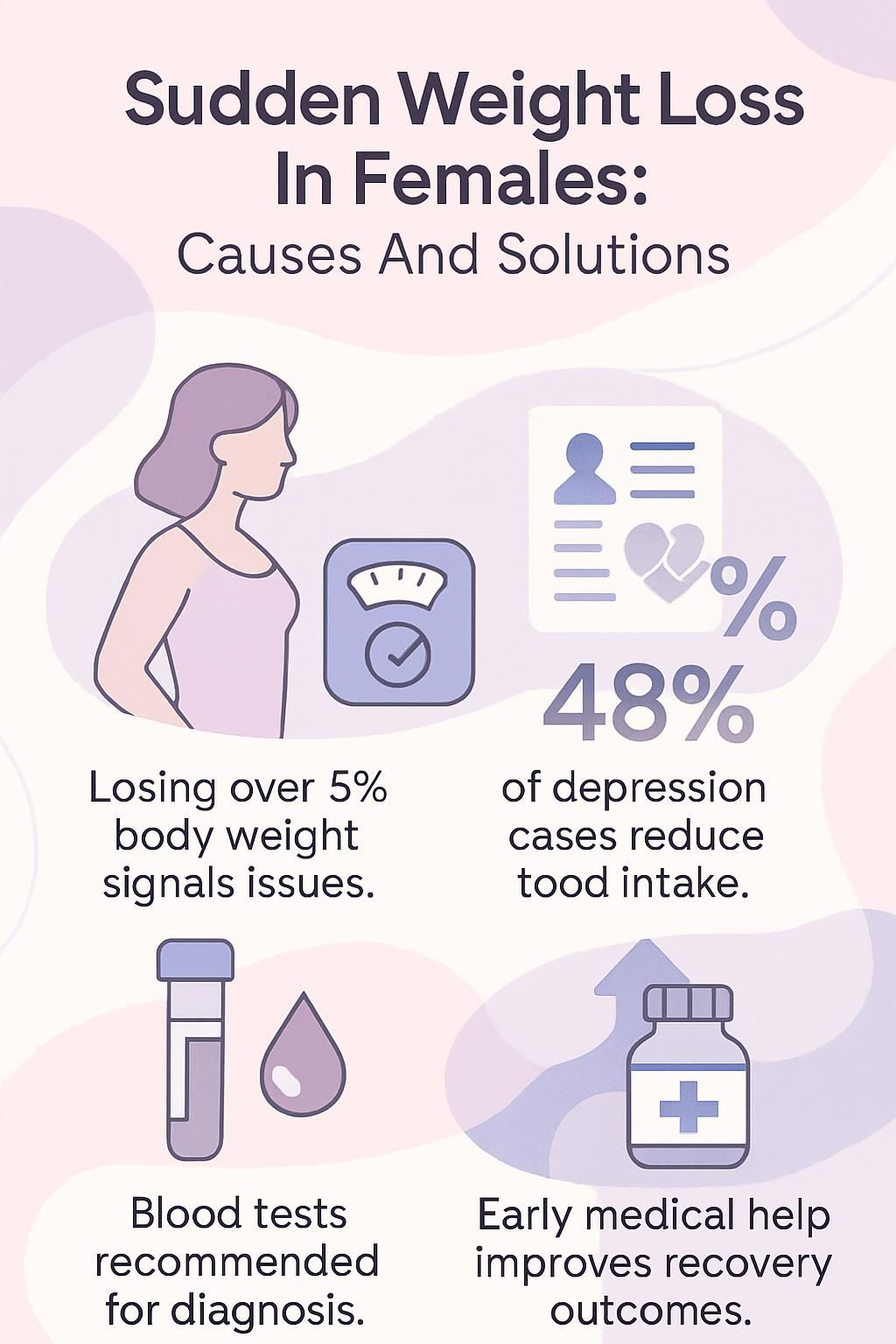Sudden Weight Loss In Females: Causes And Solutions
Our Nutrition Assistant AI Suite will transform your body. You will lose fat, get toned, and build muscle. Gain confidence and optimal health.
If you notice sudden weight loss without trying, it can feel scary and confusing. Losing more than 5 percent of your body weight, or at least 10 pounds within 6 to 12 months, counts as unexplained weight loss. Many conditions can cause it, but early action helps. This guide explains causes, warning signs, tests, and practical steps so you can get help sooner.
Use these insights to understand what might be happening, then plan your next move with your clinician.
Key Takeaways
- Sudden weight loss in females, defined as losing over 5 percent of body weight within 6 to 12 months without trying, can be an early sign of illness such as diabetes, hyperthyroidism, cancer, or digestive disorders, based on guidance from Mayo Clinic and Johns Hopkins Medicine.
- Medical causes include an overactive thyroid, uncontrolled diabetes, gastrointestinal diseases that limit nutrient absorption, several cancers, and adrenal insufficiency that disrupts hormones.
- Mental health conditions, including major depressive disorder and eating disorders, can reduce appetite and food intake, which leads to unintentional weight loss.
- Doctors may use blood tests, such as thyroid panels, A1C, and CBC, along with celiac antibodies, cortisol checks, and imaging, like CT or MRI, when symptoms persist.
- Seek care promptly if you lose weight quickly and develop other symptoms, such as fatigue, fever, pain, or night sweats. Early diagnosis often improves recovery.

What is Sudden Weight Loss?

Sudden weight loss means you lose a noticeable amount of weight in a short time without trying. This kind of drop can point to a health condition that needs attention.
What does sudden weight loss mean?
Losing 5 percent or more of your body weight within 6 to 12 months without changing diet or activity is considered sudden, unintentional weight loss. For example, at 150 pounds, a loss of 7 to 8 pounds in half a year without effort should be checked.
Clinicians view unexplained weight loss as a red flag. Possible causes include thyroid disease, diabetes, cancer, digestive disease such as ulcerative colitis or Crohn’s disease, and major depressive disorder.
Any unexplained change in body weight can be an early warning sign that needs medical attention.
Weight loss often includes fat and muscle. You may also notice a lower appetite or weaker grip strength.
Why is sudden weight loss a concern for females?
Women who lose weight without trying can face unique risks. Loss of both fat and muscle may cause weakness, tiredness, and difficulty with daily tasks. An underlying illness can also affect menstrual patterns and mood.
Older adult women face higher risk for bone loss and fractures if weight drops quickly. Hair thinning, dry skin, and brittle nails may point to nutrient gaps. Since some autoimmune diseases are more common in females, early evaluation is wise. Mayo Clinic guidance supports seeking help when these signs appear.
Common Medical Causes of Sudden Weight Loss
Unintentional weight loss can come from several medical conditions. Finding the root cause helps your care team choose the right treatment.
How does an overactive thyroid cause weight loss?
In hyperthyroidism, the thyroid gland makes too much thyroid hormone. These hormones speed up metabolism, so your body burns more calories, even at rest. You may lose weight while eating the same amount of food.
Other signs can include a fast heartbeat, sweating, anxiety, tremor, and poor sleep. Clinicians confirm the diagnosis with blood tests that measure TSH, T3, and T4.
I started losing weight so quickly that my clothes became baggy within weeks even though I was not dieting.
If you notice these symptoms with rapid weight loss, ask your doctor to evaluate your thyroid.
Can diabetes lead to sudden weight loss?
Yes. When diabetes is undiagnosed or poorly controlled, glucose stays in the blood instead of entering cells for energy. Your body then breaks down fat and muscle for fuel, which leads to weight loss.
Other signs include excessive thirst, frequent urination, blurred vision, and fatigue. Blood tests such as fasting glucose or A1C can confirm the diagnosis.
What digestive disorders cause sudden weight loss?
Several gastrointestinal diseases can cause weight loss by limiting nutrient absorption or lowering appetite:
- Celiac disease, a gluten reaction that damages the small intestine, reduces absorption and often causes diarrhea.
- Crohn’s disease and ulcerative colitis, two inflammatory bowel diseases, can trigger nausea, diarrhea, pain, and poor intake.
- Chronic gastritis, ulcers, or pancreatic problems can reduce appetite and digestion.
Active inflammation may also raise your calorie needs, which makes weight loss worse if intake stays low.
How does cancer affect body weight?
Some cancers change how your body uses energy, increasing calorie burn at rest. Others cause early fullness, nausea, or changes in taste that reduce food intake. Treatments like chemotherapy can add to these effects.
A sudden drop of 5 percent or more within 6 to 12 months, especially with night sweats or fever, should be checked. Cancer screening and imaging can help find the cause.
What is adrenal insufficiency and its impact on weight?
Adrenal insufficiency, also called Addison’s disease, happens when the adrenal glands do not make enough cortisol and aldosterone. Low hormone levels can cause nausea, vomiting, diarrhea, salt craving, low blood pressure, and fatigue.
Many people lose appetite and weight. Treatment aims to replace missing hormones and manage symptoms.
Mental Health and Sudden Weight Loss
Mental health can affect appetite and eating patterns. When mood or anxiety changes, weight can shift even if you do not intend it.
How can depression cause weight loss?
Depression often lowers appetite and interest in food. You might skip meals or forget to eat. Over time, that gap in calories leads to weight loss.
Low energy and poor sleep can make shopping and cooking feel hard. If you feel low for weeks and notice weight loss, talk with a clinician or therapist.
What effects does anxiety have on eating habits?
Anxiety can reduce hunger or throw off your routine. You might eat less during the day, then snack at odd hours. Irregular patterns make it easy to miss calories your body needs.
Chronic stress often appears with anxiety. Together, they can blunt appetite and lead to unintentional weight loss.
What are common eating disorders linked to weight loss?
Anorexia nervosa involves severe food restriction and intense fear of weight gain. Bulimia nervosa includes binge eating followed by behaviors such as vomiting or laxatives. Both can cause significant weight loss and serious health risks.
Warning signs include strict rules about food, dizziness, cold intolerance, and missed periods. Early treatment improves recovery, so seek help if you see these patterns.
Lifestyle Factors Contributing to Sudden Weight Loss
Changes in routine can push your calorie balance into a deficit. Knowing what to watch helps you correct course sooner.
Can increased physical activity cause sudden weight loss?
A sudden jump in activity can cause weight loss if you do not eat more to match the burn. Training for an event or adding intense classes can create a calorie gap within days.
If you feel weaker or more tired as the scale drops, talk with a clinician or sports dietitian. You may need more calories, protein, and fluids.
How do dietary changes affect sudden weight loss?
Large cuts in calories often cause quick weight loss. Removing food groups can also create nutrient gaps. For example, skipping dairy can lower calcium and vitamin D intake.
Rapid shifts can reduce muscle along with fat. If you change your diet and feel unusually tired or irritable, check in with a healthcare professional to rule out hidden causes.
What role does chronic stress and sleep deprivation play?
Long-term stress can suppress appetite and upset digestion. Poor sleep disrupts hormones that regulate hunger and fullness. Getting less than seven hours a night can lower energy and affect choices the next day.
Improving sleep and stress management often stabilizes appetite and weight.
How does substance use influence metabolism and weight?
Alcohol and some drugs reduce appetite and irritate the stomach, which may cause nausea or vomiting. Certain prescriptions can dull hunger or change taste.
Long-term use can harm the liver and kidneys, which affects how you process nutrients. If you notice quick weight loss while using substances or new medicines, contact your clinician.
Other Possible Causes
Several other factors can contribute to unintentional weight loss. These include medications, infections, hormones, and nutrient gaps.
What medications can cause sudden weight loss?
Some medicines reduce appetite or change taste, which lowers intake. Others increase metabolism or upset digestion. Examples include thyroid hormone replacement, certain antidepressants, ADHD stimulants, and some cancer treatments.
Report fast weight changes to your prescriber. An adjustment or a different option may help.
Can severe infections lead to weight loss?
Yes. Fever, dehydration, diarrhea, and vomiting can cause quick losses in fluids and calories. Intestinal infections, such as Giardia, often reduce absorption as well.
If illness lingers and eating stays difficult, ask for medical evaluation. Fast weight loss during infection can mean you need extra support.
How do hormonal changes like menopause affect weight?
During menopause, estrogen and progesterone levels fall. Sleep disruption from hot flashes and night sweats can change appetite and metabolism. Some women gain weight around the abdomen, while others lose weight without trying due to related conditions.
Electrolyte problems, such as low sodium, and calcium shifts can also affect weight. Your doctor may use blood work or imaging to rule out other causes if weight changes are rapid.
Summary table:
| Hormonal condition | Potential weight effect | Related terms |
|---|---|---|
| Menopause | Gain or loss | hot flash, unexplained weight loss |
| Hyponatremia | Sudden weight loss | low blood sodium |
| Hypercalcemia | Sudden weight loss | high blood calcium |
| Adrenal problems | Metabolism disruption | adrenal insufficiency |
What nutritional deficiencies cause weight loss?
Deficiencies in iron, vitamin B12, folate, vitamin D, zinc, or protein can reduce appetite, energy, and muscle strength. Digestive conditions, such as celiac disease, make absorption harder and can lead to unintentional weight loss.
Simple blood tests can find many deficiencies. Treatment might include diet changes, supplements, or support for the underlying cause.
Warning Signs to Watch For
Weight is one piece of the picture. Extra symptoms help you judge urgency and guide next steps.
What symptoms indicate unexplained fatigue or weakness?
Red flags include tiredness that does not improve with rest, dizziness, shortness of breath with simple tasks, and new muscle weakness. These may point to anemia, infection, heart or lung issues, or hormonal problems.
If fatigue grows while your weight drops, book a medical visit soon.
How do frequent illnesses relate to sudden weight loss?
Getting sick more often can signal a weakened immune system or poor nutrition. Each illness raises energy needs, so your body may use stored tissue for fuel.
If repeated infections show up with weight loss, ask for evaluation and lab work.
What mood or mental changes should raise concern?
Persistent sadness, loss of interest, anxiety, irritability, or withdrawal from friends can point to depression or an anxiety disorder. These conditions often reduce appetite and disrupt sleep.
Pairing mood changes with rapid weight loss should prompt a mental health checkup.
What symptoms like night sweats or abdominal pain are warning signs?
Night sweats that soak clothes or sheets, new fever, severe abdominal pain, vomiting, or ongoing diarrhea are important signals. These symptoms, combined with sudden weight loss, need timely medical care.
Avoid self treating in these cases. Prompt evaluation can prevent complications.
Diagnostic Tests for Sudden Weight Loss
Your healthcare provider may suggest several tests. The goal is to find the cause and start the right treatment.
What blood tests help find causes of weight loss?
Common tests include:
- Thyroid panel, TSH, T3, T4, to check for hyperthyroidism.
- Glucose and A1C, to screen for diabetes.
- Complete blood count, to look for anemia or infection.
- Celiac antibodies, to assess gluten related damage and absorption problems.
- Cortisol or ACTH tests, to evaluate adrenal function.
- Liver and kidney panels, to assess metabolism and appetite regulation.
Results guide next steps, such as imaging or referral to a specialist.
When are imaging tests like CT or MRI needed?
CT or MRI may be ordered if blood tests do not explain weight loss or if your symptoms suggest a problem in the chest, abdomen, or pelvis. These images can reveal tumors, inflammation, or organ changes.
In research summaries, a portion of unexplained weight loss cases reveal serious conditions through imaging [1]. Scans help your team choose the right treatment plan.
[1] Johns Hopkins Medicine: Unintentional Weight Loss (2023)
How are hormonal levels assessed in weight loss cases?
Hormone checks are done with blood tests. Thyroid tests measure TSH, T3, and T4. For adrenal questions, an ACTH stimulation test or morning cortisol may be used. Results are compared with normal ranges for your age and sex.
If results are abnormal, your provider may add confirmatory tests or refer you to an endocrinologist.
What gastrointestinal tests diagnose underlying issues?
To evaluate the digestive tract, your doctor may recommend:
- Upper endoscopy, to view the esophagus, stomach, and small intestine.
- Colonoscopy, to check the colon for inflammation, bleeding, or tumors.
- Stool studies, to look for infection or poor absorption.
These tests can identify ulcers, celiac disease, inflammatory bowel disease, and some cancers. Findings guide treatment and diet changes.
Effective Solutions for Sudden Weight Loss
Treatment works best when it targets the cause. Your plan may include medical care, nutrition support, and mental health care.
What medical treatments address sudden weight loss causes?
Treatments vary:
- Infections may need antibiotics or antiviral therapy.
- Hyperthyroidism can be treated with medicines that lower hormone production.
- Diabetes care can include insulin or oral medicines to manage blood sugar.
- Celiac disease requires a strict gluten free diet.
- Inflammatory bowel disease may need steroids or immune therapy.
- Adrenal insufficiency requires hormone replacement.
- Cancer care may involve surgery, chemotherapy, or radiation.
Your clinician will match the plan to test results and your goals.
How can mental health support help with weight loss?
Therapy and, when needed, medication can lift mood and reduce anxiety. As symptoms improve, your appetite and routine often stabilize. Cognitive behavioral therapy can provide skills that support regular meals and self care.
Support from family, peers, or a counselor increases the odds of healthy weight regain.
What dietary changes aid in managing sudden weight loss?
Focus on calorie dense, nutrient rich foods. Helpful choices include nut butters, whole milk yogurt, avocado, eggs, pasta, olive oil, beans, and lean meats. Small, frequent meals are easier when appetite is low.
Tips you can try:
- Add a smoothie with milk, oats, nut butter, and fruit between meals.
- Include protein at each meal, such as eggs, chicken, tofu, or fish.
- Use healthy fats liberally, like olive oil on vegetables and grains.
- Consider oral nutrition shakes if eating is hard.
A registered dietitian can tailor a plan to your needs and health conditions.
Which stress management techniques are effective?
Mindfulness practice, brief breathing drills, and muscle relaxation can lower stress chemicals and improve appetite cues. Ten minutes a day makes a difference. Many people also benefit from cognitive behavioral therapy to manage daily pressures.
Light activity, such as walking, and steady sleep habits help reset hunger and energy.
When to Seek Medical Attention
Do not wait if weight drops fast, especially with other concerning symptoms. Early care can prevent complications.
What are the red flags requiring immediate medical help?
Get urgent help for any of the following with sudden weight loss:
- Night sweats, fever, or chills without a clear cause.
- Severe abdominal pain, repeated vomiting, or persistent diarrhea.
- Confusion, fainting, chest pain, or shortness of breath.
- Blood in stool or urine, or rapid heart rate.
- Weight loss greater than 5 percent within 6 to 12 months.
These signs can indicate a serious problem that needs prompt evaluation.
Why is early diagnosis important for sudden weight loss?
Finding the cause early allows treatment to start sooner. Early treatment can help you regain weight, improve strength, and avoid complications. It can also shorten recovery time and reduce stress.
Bring a simple symptom log to your appointment. Notes about appetite, sleep, mood, and bowel habits help your clinician get answers faster.
Preventing Sudden Weight Loss
You can lower your risk with steady habits and regular checkups. Small steps add up over time.
How can a balanced diet and checkups prevent weight loss?
Build meals with lean protein, vegetables, fruits, whole grains, and healthy fats. This balance supports energy, bone health, and a stable weight. Nutrition that meets your needs lowers the risk of anemia and malnutrition.
Routine medical visits help detect thyroid problems, diabetes, and digestive disease early. Screening and basic labs can catch issues before weight drops.
What strategies help manage stress and mental health?
Set a consistent sleep schedule, move your body most days, and use short mindfulness sessions. Talking with a counselor can reduce anxiety or depression and protect your appetite. Social support from friends and family also helps.
Set small daily goals, such as eating three times per day, and track them in a note on your phone.
How should medication side effects be monitored?
Keep a daily log of appetite, energy, bowel habits, and weight. Share updates with your healthcare provider at each visit. Call sooner if you notice fast changes after starting or adjusting a prescription drug.
Never stop a medicine on your own. Work with your prescriber to adjust the plan safely.
Conclusion
Sudden weight loss in females is a signal to act. If you are losing weight without trying, especially more than 5 percent within 6 to 12 months, schedule a medical visit. With the right tests and a clear plan, most people can stabilize, treat the cause, and regain strength.
This content is for education only, not a substitute for professional care. If you have urgent symptoms, seek medical help now.
FAQs
1. What are common causes of sudden weight loss in females?
Sudden weight loss in women often results from medical conditions such as thyroid disorders, diabetes, digestive diseases like celiac disease or Crohn’s disease, mental health issues including depression and anxiety, or certain cancers. Hormonal changes and eating disorders can also contribute to rapid weight reduction.
2. How can stress affect a woman’s body weight?
Chronic stress may disrupt hormone levels that regulate appetite and metabolism. This disruption sometimes leads to unintentional weight loss due to reduced food intake or increased energy use by the body during stressful periods.
3. When should a female seek medical help for sudden weight loss?
A woman should consult a healthcare provider if she loses more than five percent of her body mass within six months without trying. Other warning signs include fatigue, persistent stomach pain, irregular menstrual cycles, or unexplained weakness.
4. What solutions exist for managing unexpected weight loss in females?
Effective management starts with identifying the underlying cause through clinical evaluation and lab tests. Treatment may involve medication for hormonal imbalances or infections; therapy for mental health concerns; dietary adjustments guided by registered dietitians; and regular monitoring of nutritional status using data on calorie needs and nutrient intake.
Summary: Sudden unexplained weight drop in women signals possible health problems ranging from metabolic diseases to emotional distress. Early diagnosis paired with targeted treatment improves outcomes while restoring healthy body composition and overall well-being.
Personal Experience: A patient once shared how addressing her thyroid imbalance reversed her unintended slimming trend after months of worry about ongoing fatigue and muscle weakness—a reminder that prompt action makes recovery possible when facing abrupt physical changes.







